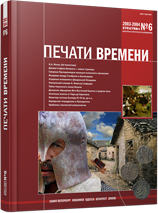Молдавия и Крымское ханство (1718-1774 гг.)
Relations of Moldova and the Crimean Khanate in 18th Century (1718-1774)
Author(s): Dan I. KhaidarlySubject(s): History, Diplomatic history, Military history, Modern Age, 18th Century
Published by: Издательский дом Stratum, Университет «Высшая антропологическая школа»
Summary/Abstract: This doctoral thesis explores Moldavian-Tartar relations (political, diplomatic, financial-economic character, territorial disputes and military co¬operation) and their evolution and appreciates their role in political history of South-East and East Europe by using Russian, French, Romanian, Turkish and other archival records (published and unpublished). The research concluded, among other, that in 18th century the Crimean Khanate was used by the Ottoman Porta to suppress Moldavian principality’s will to get free from under the Ottoman domination; the principality was the object of double Turkish-Tartar exploitation and under continuous threat of Nogay nomads’ encroachments, having to pay enormous amounts to the Tartars and the Nogays, far exceeding the established annual tribute in 18th c.; threatened by expansion of the European States, the Ottoman Porta made efforts to build the regional system of effective control over possessions of the Ottoman Empire, with Moldavian ruler, the Crimean Khan and the governors of Ottoman fortresses in the North-West Black Sea region as its participants; the results of Russian-Turkish war in 1768-1774 led to disintegration of Moldavian-Tartar relations marking the end of exploitation of the Principality by Tartar and Nogay leaders.
Journal: Stratum plus. Археология и культурная антропология
- Issue Year: 2004
- Issue No: 6
- Page Range: 244-319
- Page Count: 76
- Language: Russian
- Content File-PDF

